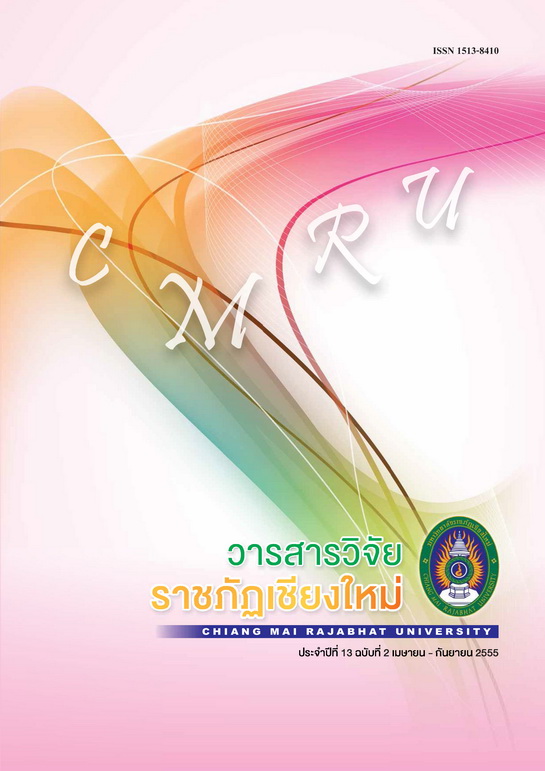รูปแบบการบริหารสถานศึกษาขั้นพื้นฐานตามหลักปรัชญาของเศรษฐกิจพอเพียง
DOI:
https://doi.org/10.14456/rcmrj.2012.96115Keywords:
ปรัชญาของเศรษฐกิจพอเพียง, การบริหารสถานศึกษา, รุปแบบ, The philosophy of sufficiency economy, School administration, ModelAbstract
การวิจัยครั้งนี้มีวัตถุประสงค์เพื่อสังเคราะห์บทเรียนและนำเสนอรูปแบบที่เหมาะสมของการบริหารสถานศึกษาขั้นพื้นฐานในการบูรณาการหลักปรัชญาของเศรษฐกิจพอเพียงสู่การปฏิบัติในสถานศึกษาพอเพียงต้นแบบเป็นการวิจัยเชิงคุณภาพดำเนินการวิจัยเป็น 3 ระยะคือ 1) การพัฒนารูปแบบที่คาดหวังด้วยการวิเคราะห์เอกสาร 2) การพัฒนารูปแบบที่เป็นไปได้ด้วยวิธีกรณีศึกษา 3) การพัฒนารูปแบบที่เหมาะสมด้วยการตรวจสอบซาในสถานศึกษาพอเพียงต้นแบบ ผลการวิจัยสรุป ได้ดังนี้
1. ผลการสังเคราะห์บทเรียนการบริหารสถานศึกษาขั้นพื้นฐานตามหลักปรัชญาของเศรษฐกิจพอเพียงที่ก่อให้เกิดผลสำเร็จและสามารถเป็นแบบอย่างได้พบว่า
1.1 งานบริหารวิชาการ มีการจัดทำหลักสูตรสถานศึกษาโดยบูรณาการหลักปรัชญาของเศรษฐกิจพอเพียงทกกสุ่มสาระ โดยเน้นให้ผ้เรียนนำความรู้ไปปฏิบัติในชีวิตประจำวัน ซึ่งเป็นการขยายผลสู่การปฏิบัติในครอบครัว ชุมชนอันเป็นการส่งเสริมให้นักเรียนปฏิบัติตนอย่างมีสติปัญญาและยึดมั่นในทางสายกลาง และดำเนินชีวิตด้วยความซื่อสัตย์สุจริต อดทนแบ่งปัน รับผิดชอบ และอยู่ร่วมกันอย่างมีความสุข ตลอดจนรักและภาคภูมิใจในความเป็นไทยด้านการพัฒนาคุณภาพการศึกษาได้จัดให้มีการศึกษาวิเคราะห์สภาพความต้องการ ความจำเป็นของสถานศึกษาเพื่อวิจัยและพัฒนาคุณภาพการศึกษา และส่งเสริมให้ครูทำการวิจัยในขั้นเรียนตามความรู้ความสนใจ และศักยภาพของแต่ละคน และยังมีการประสานความร่วมมือในการศึกษาวิจัยเกี่ยวกับ ปรัชญาของเศรษฐกิจพอเพียง เพื่อพัฒนาคุณภาพการศึกษากับสถานศึกษา บุคคล ครอบครัว องค์กร หน่วยงาน และสถาบันอื่น และนำผลการวิจัยไปใช้ให้เกิดประโยชน์ต่อการพัฒนาคุณภาพการศึกษา
1.2 งานบริหารงบประมาณ มีการจัดทำและเสนอของบประมาณตามความเหมาะสมและความต้องการที่แท้จริง โดยคำนึงถึงความเหมาะสมและความจำเป็นของสถานศึกษา โดยมีการวิเคราะห์ทิศทางและยุทธศาสตร์ของหน่วยงาน และมีการจัดทำรายละเอียดโครงสร้างแผนงานโครงการและกิจกรรมที่ชัดเจน โดยอยู่บนพื้นฐานของความโปร่งใสและยุติธรรม สามารถตรวจสอบได้ตลอดจนมีความซื่อสัตย์ในการบริหารการเงิน บัญชี และการจัดซื้อจัดจ้าง
1.3 งานบริหารงานบุคคล มีการวางแผนอัตรากำลังตามความต้องการและความจำเป็นของสถานศึกษา โดยมีการวิเคราะห์ภารกิจและประเมินสภาพความต้องการกำลังคนกับภารกิจของสถานศึกษา และมีการส่งเสริมให้ข้าราชการครูและบุคลากรทางการศึกษามีการพัฒนาตนเองตามความต้องการและความจำเป็น ตลอดจนมีความยุติธรรมในการขอเลื่อนขั้นและเลื่อนตำแหน่ง รวมทั้งมีความเสมอภาคในการได้รับการพัฒนาตามศักยภาพ
1.4 งานบริหารทั่วไป มีการใช้อาคารสถานที่อย่างประหยัด คุ้มค่า ตลอดจนมีการบำรุง ดูแล และพัฒนาอาคารสถานที่ สภาพแวดล้อมของสถานศึกษา และสร้างจิตสำนึกให้ทุกคนมีส่วนรับผิดชอบในการดูแลรักษา รวมทั้งมีความเอื้อเฟ้อบริการอาคารสถานที่แก'ชุมชนในการจัดทำกิจกรรมต่างๆ ด้านความสัมพันธ์กับชุมชน มีการนำภูมิป้ญญาท้องถิ่นหรือเครือข่ายผู้ปกครองชุมชน เข้ามามีส่วนร่วมในการจัดกระบวนการเรียนการสอน
2. การนำเสนอรูปแบบที่เหมาะสมในการบูรณาการหลักปรัชญาของเศรษฐกิจพอเพียงสู่การปฏิบัติในสถานศึกษาขั้นพื้นฐานผู้วิจัยได้สรุปรูปแบบเป็น “โรงเรียนของพ่อ” โดยมีเสาธงเป็นเป้าหมายตามหลักปรัชญาของเศรษฐกิจพอเพียงและมีองค์ประกอบการดำเนินงาน 4 ด้าน คือ ด้านบริหารงานวิชาการ ประกอบด้วย 8 องค์ประกอบ คือ 1) การพัฒนาหลักสูตรสถานศึกษา 2) การพัฒนากระบวนการเรียนรู้ 3) การวัด ประเมินผล และการเทียบโอนรายวิชา 4) การประกันคุณภาพและมาตรฐานภายในสถานศึกษา 5) การพัฒนาการใช้สื่อและเทคโนโลยี 6) การพัฒนาและส่งเสริมให้มีแหล่งเรียนรู้ 7) การวิจัยเพื่อพัฒนาคุณภาพ 8) การส่งเสริมชุมชนให้มีความเข้มแข็งทาง วิชาการ ด้านบริหารงานงบประมาณประกอบด้วย 5 องค์ประกอบ คือ 1) การจัดทำและเสนอของบประมาณ 2) การจัดสรรงบประมาณ 3) การบริหารการเงิน 4) การบริหารบัญชี 5) การบริหารพัสดุและสินทรัพย์ ด้านบริหารงานบุคคลประกอบด้วย 2 องค์ประกอบ คือ 1) การวางแผนอัตรากำลังและกำหนดตำแหน่ง 2) การพัฒนาบุคลากรด้านบริหารงานที่ไปประกอบด้วย 3 องค์ประกอบ คือ 1) อาคารสถานที่ 2) การจัดบรรยากาศและสภาพแวดล้อมภายในสถานศึกษา 3) ชุมชนสัมพันธ์โดยในแต่ละด้านได้บุรณาการหลักปรัชญาของเศรษฐกิจพอเพียง 5 เรื่องสู่การบริหารสถานศึกษาประกอบด้วย 1) ความพอประมาณ 2) ความมีเหตุผล 3) การมีภูมิคุ้มกันในตัวที่ดี 4) เงื่อนไขความรู้และ 5) เงื่อนไขคุณธรรม
Model of Basic School Administration Based on the Philosophy of Sufficiency Economy
The objectives of this qualitative research were to synthesize lessons of basic school administration based on the philosophy of sufficiency economy in prototype sufficiency schools and to propose a suitable model for integrating sufficiency economy into such school administration. The research procedures were divided into three phrases: developing an expected model by means of documentary research, developing a feasible model by means of ten case studies of the prototype sufficiency schools and developing a suitable model by means of a seminar of experts. The findings are as follows:
1. The synthesis of successful and exemplary lessons for management of basic education based on the philosophy is found as follows:
1.1 Academic administration. School curricula was based on the philosophy which was integrated into the instructions of every strand. The focus was on the implementation of the philosophy in everyday life at individual, family and community levels by encouraging students to lead their lives wisely, moderately, honestly, patiently, generously, responsibly and happily. Furthermore, they were made to love and take pride in their being Thai. As for educational quality development, needs analyses were conducted for research and development. Teachers were encouraged to conduct classroom research in accordance with their interests, expertise and potential. Additionally, analysis collaborations on the philosophy were established in order to develop educational quality with the schools, individuals, families, organizations, agencies and other institutions.
1.2 Budget administration. Budget plans and proposals were appropriate and in line with actual needs of the schools. School strategy and direction analysis, work structures, projects and activities were conducted and planned, based on transparency and accountability. Moreover, financial administration, accounting and procurement were conducted in an honest and transparent manner.
1.3 Personnel administration. Workforce planning, analysis and assessment were conducted in accordance with actual needs of the workloads. School personnel development was encouraged according to their needs. Promotions and development were fair and based on individual merits.
1.4 General administration. School infrastructure and environment were utilized and maintained economically and cost-effectively, with a sense of responsibility and belonging being raised in all parties involved. Communities were allowed to use the school infrastructure for social activities. With respect to community relationship, local wisdom or a parents’ network were integrated or involved in the management of instructional processes.
2. A suitable model of basic school administration based on the philosophy was composed of four major operational aspects. Academic administration included curriculum development, instructional development, assessment and credit transfer, standard and quality assurance, technology and media development, learning resource development and promotion, quality research and academic and community empowerment. Budget administration was composed of budget proposal, allocation, finance, accounting and asset and procurement. Personnel administration comprised workforce planning and human resource development. General administration consisted of school infrastructure, environment and community relationships. Each aspect was composed of five indicators, namely sufficiency, rationality, immunity, knowledge and ethics.
Downloads
Downloads
How to Cite
Issue
Section
License
1. Articles, information, content, images, etc published in the “Community and Social Development Journal” are copyrighted by the Community and Social Development Journal, Chiang Mai Rajabhat University. In order to properly distribute the articles through print and electronic media, the authors still hold the copyright for the published articles under the Creative Commons Attribution (CC BY) license, which allows the re-distribution of the articles in other sources. References must be made to the articles in the journal. The authors are responsible for requesting permission to reproduce copyrighted content from other sources.
2. The content of the articles appearing in the journal is the direct responsibility of the article authors. The editorial board of the journal does not necessarily agree with or share any responsibility.














